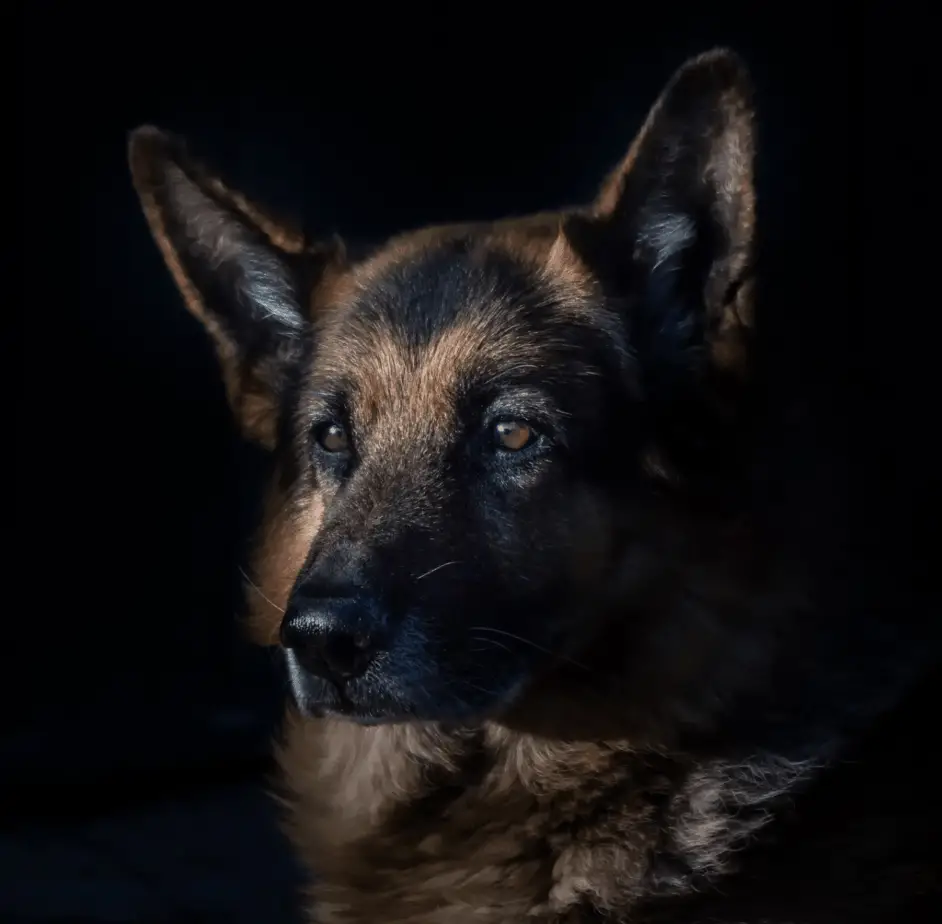German Shepherds are some of the most popular dog breeds kept as pets across the world. They’re frequently used as working dogs and, due to their faithful and highly trainable nature, they make excellent guard- and family dogs. The German Shepherd is also a fairly large dog, and that is why they have a shorter life expectancy.
An age of 12 is generally considered old for a German Shepherd as the average lifespan of this dog breed is 7 to 10 years. Due to breeding for specific standards over many decades, German Shepherds are susceptible to some hereditary diseases. Additionally, larger dogs like German Shepherds tend to lead shorter lives than smaller-sized dogs.
German Shepherds make dutiful pets and excellent working dogs in the military and law enforcement fields. This article will take a closer look at what constitutes old age for this breed, common hereditary health concerns of German Shepherds, and how to care for an elderly dog of this breed.
About The German Shepherd
The German Shepherd is a confident, courageous, and highly trainable dog. They are one of the largest dog breeds with males standing at 24 to 26 inches high and weighing in at 65 to 90 pounds. Female dogs will reach a height of 22 to 24 inches and weigh 50 to 70 pounds.
They are one of the finest all-purpose working dogs, and the American Kennel Club ranks this breed’s popularity as second in a field of 196 dog breeds. The reason why they are such a popular breed is due to their faithful, courageous, and loyal natures and their willingness to learn and defend their loved ones.
The most common health affliction that plagues the German Shepherd is elbow or hip dysplasia, and senior German Shepherds are more likely to suffer from this issue, although it can manifest from as early as five years of age.
If you notice stiffness in the joints or hind end, lameness in the back legs, or a lack of mobility in the elbow and hip joints, it is most likely that your German Shepherd is suffering from elbow or hip dysplasia, and it is best to consult a vet as soon as possible.

The American Kennel Club also states the life expectancy of the German Shepherd to be between 7 and 10 years, which is fairly low for a pet dog. (Source)
How Can I Tell If My Dog Is Elderly?
Each dog breed is unique when it concerns their activity level, trainability, and life span. The German Shepherd is a common breed, and, unfortunately, they have a fairly short life expectancy.
However, that is no reason why your German Shepherd cannot be fulfilled even in their later years. There are many signs that your German Shepherd is happy, and being in tune with these can help you prep them for their senior stage.
For most breeds, a dog is considered a senior dog at approximately eight years of age. Larger dogs age quicker than smaller dogs, and, due to the size of the German Shepherd, they may be considered a senior dog at six or seven years of age already.
As they age, every individual dog is different and will show their age in different ways, but there are some tell-tale factors that can help you determine whether or not you can consider your German Shepherd to be elderly.

Energy And Mobility
The first tell-tale sign that your dog is reaching its senior years is a drop in energy levels. German Shepherds are highly active dogs that enjoy training, having “jobs” to do, and accompanying their humans on walks or runs.
An elderly German Shepherd may start suffering from arthritis, which causes them to be a little stiffer and move a little slower. You may notice that your once-hyperactive dog now prefers to lounge around for large portions of the day, might be slower when getting up, and may prefer walking instead of running on outings.
Sight And Hearing
German Shepherds are very alert, which makes them well-suited as guard dogs. As dogs age, they may start to develop hearing and sight problems, causing them to become blind or deaf. This process generally doesn’t happen overnight and will manifest slowly over time.
If you notice that your German Shepherd takes longer to come when called, is less responsive to your voice, sleeps deeper than usual, or seems a little lost and confused, it could be that they are losing either their sight or hearing or perhaps both.
Appearance
Many people believe that a greying muzzle is the first indicator of old age. The accepted breed standard coloring for a German Shepherd is largely black and brown and, therefore, their muzzles may start going grey from a very early age.
Once again, every individual dog is different, just like no two humans are alike, and going grey may be an indicator of age, but it is not a concrete sign.
However, if your German Shepherd has started going grey, especially if it is going hand-in-hand with other tell-tale signs of age, it is highly likely that your dog has entered their senior years. (Source)
Caring For An Elderly German Shepherd
If your German Shepherd has reached the ripe old age of 12, it does not mean that their life is over. Many dogs exceed the average lifespan of the breed because an average is just that — the average. Some dogs may live shorter lives, and others may build up a few additional years.
However, if your dog has entered the senior stage or is elderly, they may need some specialized care to ensure that their golden years are happy ones.
Exercise And Activities
One of the great joys of life for a German Shepherd is activity. As your dog enters the senior stage, look to him or her for guidance as to how much exercise they want and what pace they are comfortable at.
Continue going on your daily walks, but keep a close eye on your dog — they will tell you when they’re tired and would like to stop.
If your German Shepherd is having mobility issues and is displaying stiffness or discomfort in its hind end or legs, swimming can be a wonderful exercise to take up. Swimming is less strenuous on their joints and will keep your dog active while being gentle on its aging body.
Training
The German Shepherd is, at heart, a working dog. They absolutely thrive on having a “job” to do and enjoy training and mental stimulation.
If your dog has started slowing their pace on their daily walk or is displaying discomfort and a lack of mobility, it can be enjoyable for them if you make an effort to keep their mind active.
Think of tricks and little “jobs” that you can train your German Shepherd to do that won’t be too strenuous or that require little to no agility.
This can be something as simple as teaching them to go to a certain spot (not far away), hiding treats under cups in front of the dog and training them to find it by smell, or teaching the dog to bark on command.
The mental stimulation from simple training will help keep your senior German Shepherd happy in its golden years.

Nutrition
As your German Shepherd ages, it is wise to reassess their food. Often, dog food specially formulated for senior dogs will be more digestible and significantly more nutrient-dense to compensate for lack of appetite or your dog not being able to absorb and metabolize nutrients as well as they used to.
If you are not sure, have a discussion with your vet about a possible diet switch and do it gradually by mixing their usual food with the senior dog food in increasing percentages.
Start with 90% of their usual food and 10% of the senior dog food, increasing the ratio the next week to 80%-20% and so on and so forth until they have completely transitioned to dog food formulated for senior dogs.
Health And Dental
Just as humans often need more medical attention in their elderly years, so do dogs, and German Shepherds are no exception.
As your dog ages, increase your vet visits to three times a year or once every quarter to ensure that you catch any possible warning signs as early as possible. It is also wise to brush their teeth to prevent gum disease and do frequent home health checks to make sure that you don’t miss any lumps, bumps, or red flags. (Source)
Final Thoughts
German Shepherds are one of the most popular dog breeds that people keep as pets. They are also exceptionally well-suited as working dogs, especially in the military and law enforcement field. Their dutiful nature, courageous hearts, devotion to their humans, and high trainability is what sets them apart from other dogs.
The German Shepherd is a heritage breed and a very large dog, so their life expectancy is 7 to 10 years. Twelve would be considered elderly for this breed. However, if given the proper care and attention, you can make sure that your German Shepherd’s golden years are some of its best.
